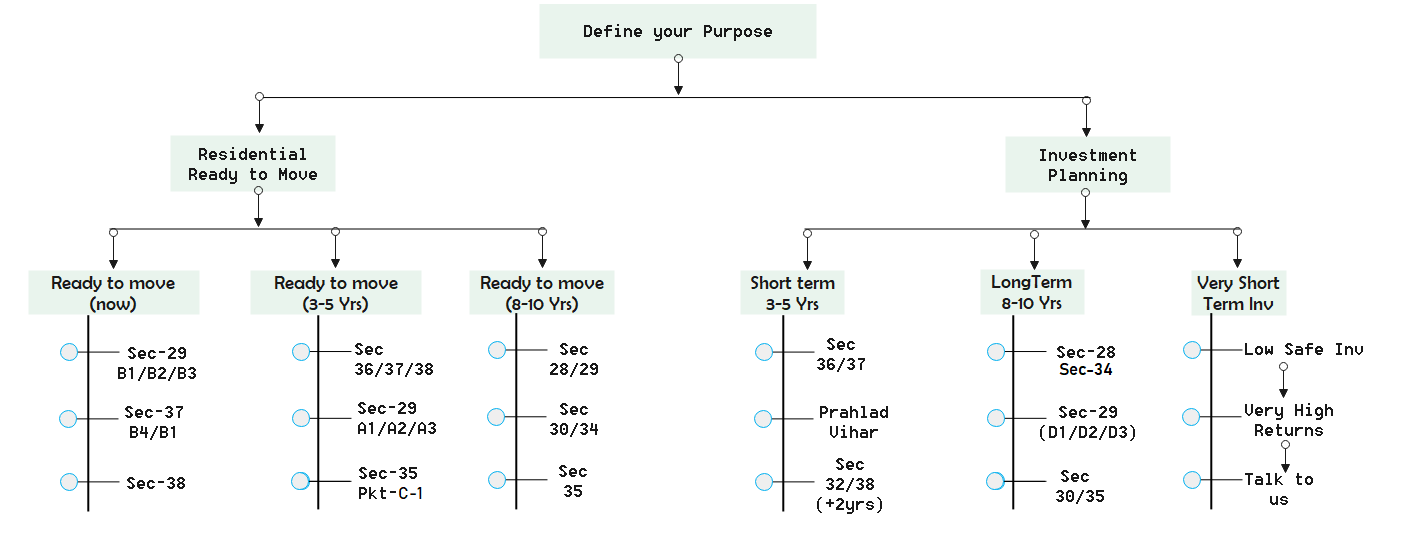Rohini comes under zone M & is a part of North-West Delhi. North-West Delhi is one of the eleven districts of Delhi having its Headquarters in Kanjhawala. Rohini is the first and oldest sub-city of Delhi, it is designed, developed and allotted by Delhi Development Authority(DDA). The foundation of Rohini was led by DDA in the pursuit to provide home to all income groups. DDA started offering property in 1980s to accommodate the huge housing demand. Rohini is a mixture of various property such as, EWS, Janta, LIG, MIG flats, Super MIG and very small to very big size plots. Wide roads, well planning, beautiful parks, hospitals, schools, colleges, police stations, shopping complexes and malls are the few basic facilities provided by DDA.
For the first time DDA invited applications in 1981 and thereafter the story of development of Rohini started and developed 41 sectors till now. The plan of every sector was meticulously designed which is offering every basic facilities to all the inhabitants of Rohini. Rohini is divided in three segments. First segement is already occupied and inhibited sectors of Rohini, second segment is new allotment and third segement is unauthorised colonies of Rohini which was a farming land in their initial stage of development but now they are the part of Rohini but DDA doesn't provide any facilities there because they are not approved by any concerned authority. Given below are the three detailed maps of already developed, Unauthorised colonies and newly allotted sectors of Rohini which will help you understand the geography of Rohini in better way.
DDA's Rohini Residential Scheme 1981: Fight for Justice
The painful story of allottees on following matters.
⚏
How DDA used its subterfuge and bluff on many occasions and had not wanted to allot plots after sector 28's allotment to the remaining 25,298 plots.
⚏
How DDA acquired approximately double the land in lieu of Rohini Residential Scheme and allotted it to non-scheme-related projects.
⚏
The DDA decreased the plot size in 1999.
⚏
How resistants of plots went to the President's Office, Lok and Rajya Sabha Speaker, LG House, Ministry of Urban Development, and PM Office but of no use.
⚏
How DDA Proposed the ministry to close the Rohini Residential Scheme 1981.
⚏
2011 Delhi High Court Bomb Blast.
⚏
How petitioners reached Delhi High Court and Supreme Court for justice in their favor.
⚏
Farmers of Barwala and nearby areas demanded their acquired land back or more compensation and didn't let the DDA work there.
What are the upcoming Projects of Rohini, Delhi ?
Upcoming proposed DDA's Zone N
Rithala-Bawana-Narela Delhi Metro Route Plan
Urban Extension Road(UER)-1/2/3
The Silk Road of Rohini & Zone N
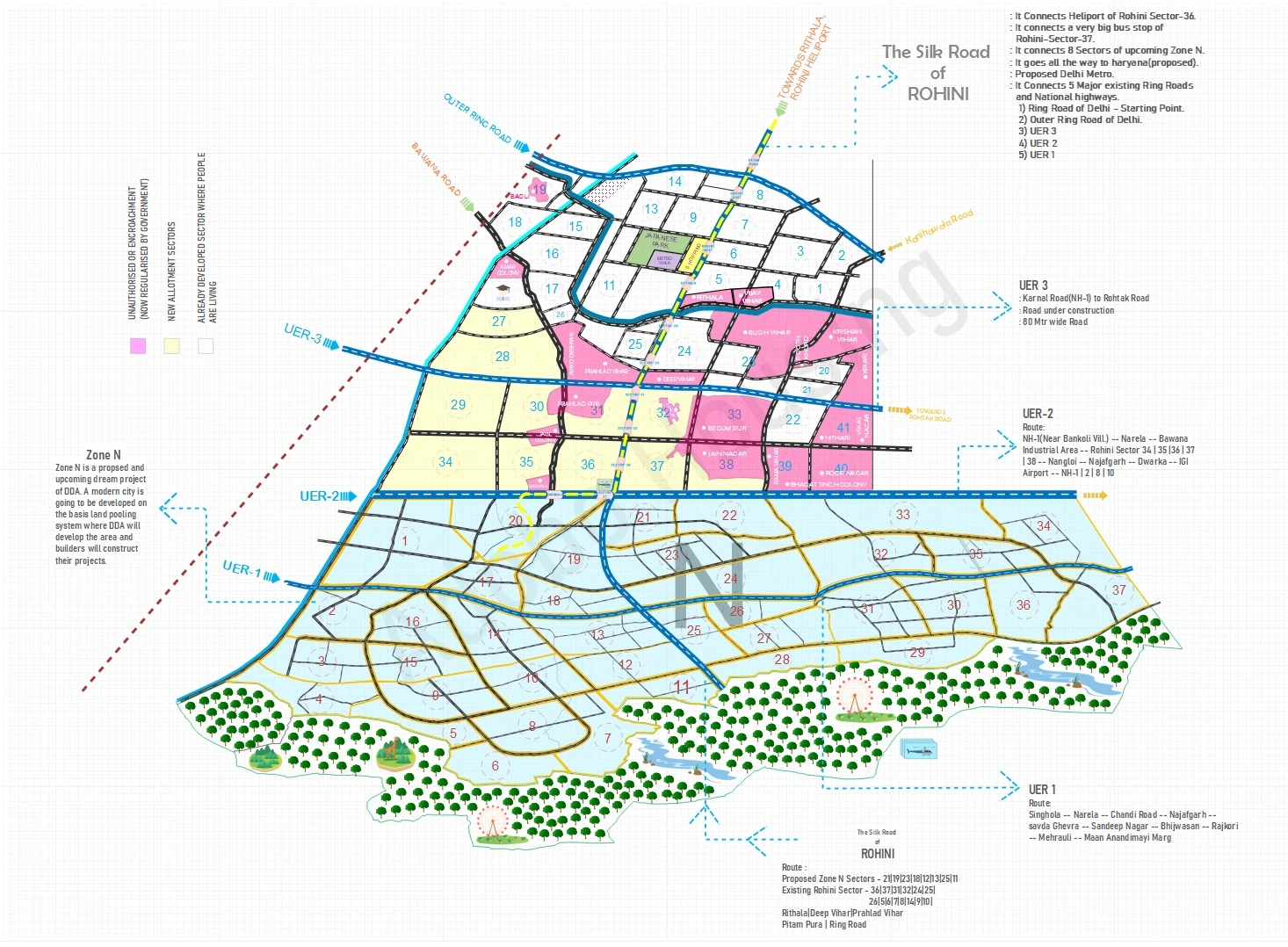
View in high Resolution
The silk road of rohini refers to a 60 meter wide road which will play a very vital role in connecting Zone N, Rohini, Pitam Pura and Netaji Subash Place. This road starts from Ring road(Netaji Subash Place) and it will touch the last boundary of Zone N. This road will connect Zone N's proposed sectors(11, 12, 13, 18, 19, 21, 23, 24, 25, 27 and 28) and Currently Sector 36, 37, 31, 32, 24, 25, 9, 10, 7, 8, 14, 6, 10 and 5 of Rohini are already connected and other areas of Rohini like Prahlad Vihar, Deep Vihar, Rithala, Pitam Pura and Netaji Subash Place are also already connected. Two major ring roads(Ring road and Outer ring road) and two Urban Extension Roads(UER-1 and UER-2) are already connected by this road and UER-1 will be connected when this road will be extended up to the last boundary of Zone N. Rithala-Bawana-Narela metro is also a proposed metro line which will not only provide better and faster connectivity but also boost the prices of Rohini and living standard. This road will be the most important road which will directly connect Zone N( upcoming ) and Rohini. We have also attached images of existing and futuristic expansion of Silk road and Zone N.
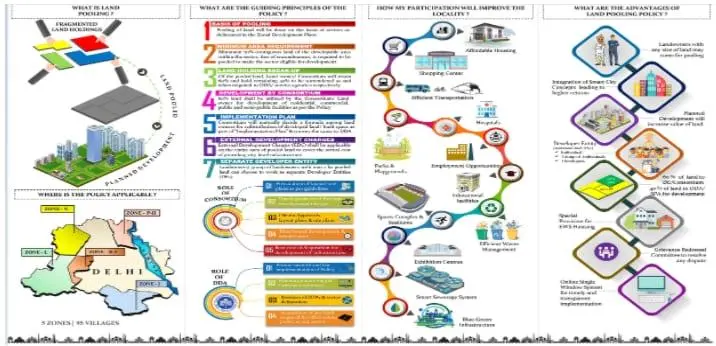
View High Resolution Image
Zone N is one of the five zones in which a proposed smart city is going to be developed under the land pooling system designed and developed by DDA. Zone N is strategically located area which covers all three major Urban Extension Roads(UER-1, 2 & 3). Land pooling system is proposed by DDA and Urban Ministry of India to accommodate the huge residential demand in which land owners can offer their land to merge those small patches of land into big land bank. After gathering big parcels of land, DDA will create the blueprint of all area and delineate the boundaries of all sectors. In simple words DDA will take the land from land owners and in return 60% of total land will be given back to them on which they can develop Group Housing societies or cut plots with the help of private builders or by themselves and on 40% land, DDA will develop public facilities like schools, colleges, hospitals, Police Stations, Mother Daries, Community Centers, Shopping Malls, Parks, Sport Complexes, Power Stations etc. For agricultural development, DDA will make warehouses and cold storages. Mapping of Sector 11, 17, 18, 19, 20 and 21 of Zone N has already been done and very soon this ambitious land pooling system is set to begin. Approximately 3268 Hactare land is approved in Zone N for residential development. This project will flourish the north-west and outer part of Delhi and this is the first land looling project of DDA. Big cities like Gurugram and noida with high rise buildings will be seen here very soon. Over all, Zone N will be the mixture of developed sectors where high rise apartments, Residential Plots(100 to 300 mtr), Commercial offices, Shopping malls and modern infrastructure will be developed by private builders on the government approved land of farmers which is taken for development by DDA. Due to some discrepancies, this project is getting late and it is expected that all the problems will be resolved very soon because DDA is constantly in touch with land owners to solve all problems.
What is the proposed route of Rithala Bawana Narela Metro ?
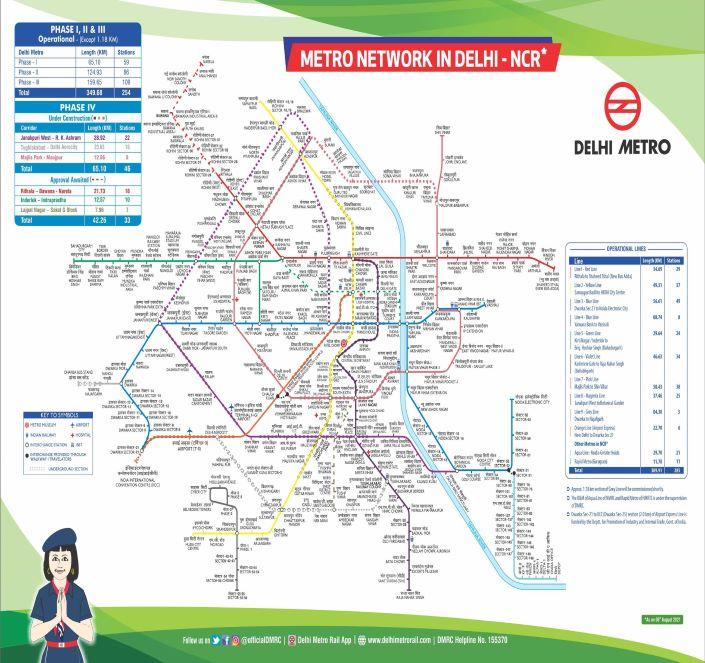
View High Resolution Image
Proposed Google Maps Route View
|| In the pursuit to provide last mile connectivity, Delhi Metro is planning to stretch its line from Rithala to Narela via Bawana which will play a very crucial role in connecting remote areas of Delhi like Rohini, Barwala, Pooth Khurd, Bawana, industrial areas, grain market and Narela. Earlier, Rithala to Bawana Metro was proposed but Delhi Metro wanted to connect remote areas of outer delhi, so Delhi Metro has changed their planning and now proposed to extend the Metro till Narela. Not only this Metro plan will connect remote areas of outer Delhi but also it will help people of that area to grow and develop. This Red Metro line will be the Extension of Shaheed Sthal to Rithala Metro Route towards Narela via Bawana. For better understanding, we have attached the official Delhi Metro's new route of proposed metro line and upcoming Rithala-Bawana-Narela google earth layout plan map below.
Proposed Rithala Bawana Narela metro Stations of Red Line - :: Rohini Sector-24 | Rohini Sector-26 | Rohini Sector 31 | Rohini Sector-32 | Rohini Sector-36 | Rohini Sector-37 | Barwala | Pooth Khurd | Bawana Ind Area-1 | Bawana Ind Area-2 | Bawana | Bawana JJ Colony | Sanoth | New Sanoth Colony | Anaj Mandi | Narela.
Urban Extension Road(UER) 1/2/3
Urban Extension roads(UER)1,2 & 3 (Google Maps View) are strategically designed and located in Zone N and M of Delhi by DDA to accommodate the surplus demand of home buyers. All three UERs will cover the important area of Zone N and M and will be proved as milestones in urbanisation and modernisation of undeveloped rural area of Zone N and L of Delhi. Currently these projects are underconstruction by different contractors and delayed due to some problems like encroachment, financial problem and project transfer to NHAI but soon these will get ready for public because these problems are almost solved. Some important points about how UERs will help in developing Rohini and Zone N. We have discussed some important features below to understand more about them.
-1-2-3-Layout-Map.jpg)
View High Resolution Image
⚏
These UERs will become a crucial source of transportation and connectivity and will help in faster development of undeveloped rural areas of Delhi.
⚏
UER-1 come under the concept of Land Pooling system which will provide an opportunity to farmers to pool their land help in development of area.
⚏
These UERs will ease the life of people by better connectivity and will take the upcoming huge burden of transportion.
⚏
Less traffic, wide roads, faster routes and better connectivity of these roads will ease the life and take less time to reach.
⚏
All major Industrial areas and Anaj Mandis like Bawana Industrial area, Mundka Industrial area, Narela Anaj Mandi(Grain Market) And Najafgarh (Grain Market) Anaj Mandi will be covered by these roads which will provide employment opportunities to job seekers and business opportunity to farmers.
⚏
Road Transport and Highways in its Gazatte notification S.O. 1466(E) dated 3rd April, 2018 named UER-2 as National Highway-344M(NH-344M).
⚏
These roads will be constructed in rural areas where transportation and road connectivity is a big problem. These rural ares will be converted as urban areas like Dwarka of Delhi once these roads will be constructed.
⚏
High quality construction is expected because now NHAI will construct these roads.
⚏
Billions of rupess are going to be spent on this dream project of Zone N by builders so these UERs will play a vital role in connecting important areas of upcoming city of Zone N where DDA and private builders will mutually develop this area.
⚏
These roads will divert other state's traffic and work as bypass where drivers do not have to enter into Delhi and these UERs will connect major National Highways like NH-1, NH-2, NH-10, NH-8, Indira Gandhi International(IGI) Airport, Industrial areas and Grain Markets of Delhi.
⚏
Business will become easier because of excellent connectivity with other cities like Gurgram, Faridabad, Mathura, Agra, Noida and four National Highways of India.
⚏
These Roads will boost the economic and industrial development and flourish the area and its property prices. Delhi Metro will also connect these Urban Extension Roads and ease the transportation problem of commuters and also boost the economical development of this area.
⚏
Width of UER 1 & 2 is 100 mtr.
⚏
Width of UER-3 is 80 Mtr.
What is route map of Urban Extension Road(UER) 1/2/3 ?
Wazirabad Flyover - Bund Road- NH-1(Near Bankoli Village) - Narela - Bawana Industrial Area - Rohini Sector 34/35/36/37/38 - Nangloi - Najafgarh - Dwarka - IGI Airport - NH-1/10/8/2.
UER-1 Route : Wazirabad Flyovern - Bund Road - Singhola - Narela - Western Yamuna - Chandi Road - Najafgarh - Kanjhawala - Savda Ghevra - Sandeep Nagar - Bhijwasan - Rajkori Mehrauli - Maan Anandimayi Marg.
UER-3 Route : Wazirabad Flyover - Bund Road - NH-1 to Karnal Road - Tivoli Grand Resort - Khera Kalan Village - Rohini Sector 28/29/30/31/32/Deep Vihar - Begum Pur - Rohini Sector 21/22 - Baljit Vihar - Nangloi - NH-10(Delhi-Rohtak Road).
Step by Step guide to buy Rohini Property
Step by step guide covers every possible step which must be taken before and while buying plots in Rohini to save you from every possible threat and fraud. With the help of actual Layout plans of Rohini sectors, hi-resolution images, Maps and charts, we have tried to elaborate all possibilities. High level DDA Experts' advice will help you make your planning more precisely and answer every possible question you have in your mind. Kindly read all the important step-by-step tips before buying property in Rohini.
1.a)
Define the Purpose
: Why do you want to buy property ? The purpose of buying property must be crystal and clear due to the huge involvement of money. If you want to buy property in Sector 28, 29, 30, 32, 34, 35, 36, 37 & 38 of Rohini, on the basis of their location and situation, we have done some analysis which will help you answer few questions like why, where and how to invest.
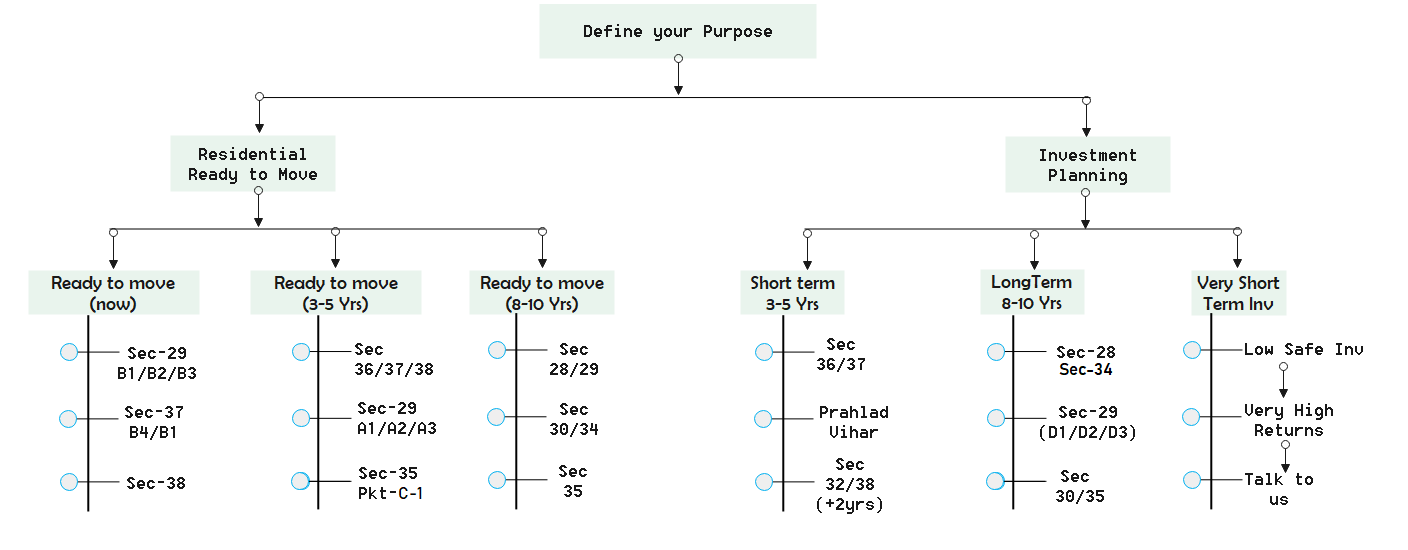
High Resolution view : View
1.b)
Types of Highly Liquid Plots
: Highly liquid properties are those properties which are very easy to sell and their location is very good and its examples are
Corner || Park Facing || 24 Meter Facing || 30 Meter Facing || North-East Facing || 12 Meter Facing
2)
Choose sectors according to your Budget
: Rohini possess many new allotment sectors on different locations having different budget segments from low budget segment to high budget segment. Budget is primary and important factor to consider for any purpose.
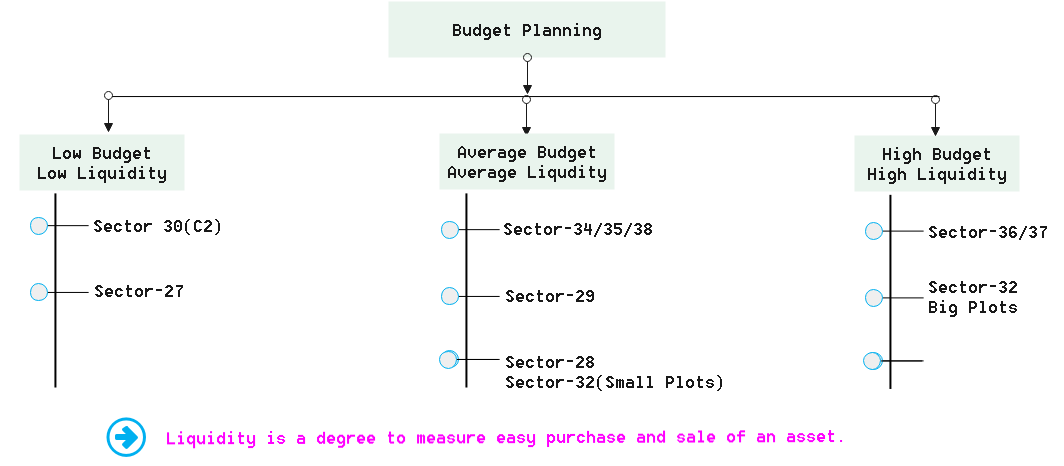
High Resolution view : View
2)
Always prefer a Knowledgeable property agent
: It is very important to find a good agent equipped with all knowledge of all sectors. Incomplete knowledge of agent can lead you to make wrong decisions. Ask him to provide the list of available plots and choose one of them. To cross check the price of property, kindly meet with more agents. It is suggested to gather knowledge of all sectors and their potential investment benefits. He must equipped with all knowledge including current and upcoming facilities and projects of that sector. Kindly check agents' background and history to proceed further because he will be the accountable person for your decision and money spent on that property.
3)
Visit the site
: Site visit is important to get the idea of current and futuristic development. We shouldn't make our property buying decision before visiting site. In new allotment, there are few sectors whose boundaries are touching the unauthorised colonies and these sectors are considered cheaper but in our opinion these sectors have good potential and currently they are cheaper in price so one should not neglect them because development shall start from here. Don't believe in dealers' words, visit yourself to see their potential. There is no problem in buying plots in these sectors. Buying high cost plots in costlier sectors doesn't make sense and ignoring these potential sectors is a mistake. When you visit the site, kindly observe the potential problems a plot can have.
a) Is there any tree on that plot ?
a) Electric pole and its line
c) Sewer
d) Prefer good location plots because of high liquidity
4)
Price determination & negotiation of property
: Good location plots come with high price and high liquidity and average location plots come with low price and low liquidity. We suggest you to kindly go for good loacation plots if you have sufficient budget else you can go for average location plots. Always try to check the price in market and negotiate. We suggest you not to leave that plot for only few thousands or lakh, if you like that proerty, just go for it. I have met with several people who came one or two years before and told us the previous price of property and have seen them repenting over their decision of not buying that property when they came here first.
4)
Important documents of property
:Make sure that the allottee or financer has all the documents with him in its original form. List of must have all documents of allottee in its original form.
1) First deposit receipt (FDR).
2) Demand cum Attotment letter.
3) Bank Challan/Receipt of paid amount of Demand cum allotment letter.
4) Receipt of possession of property in DDA.
5) Receipt of possession of property on site.
6) Leasehold Documents.
7) Mutation in case of death.
8) Freehold property documents in case it is freehold.
5)
Beware of fake documents & fake allottees
: You are requested to stay away from these kind of agents because you are going to involve a huge amount of money. You are requested ro kindly recheck the documents in DDA for their authenticity, they must not be fake because in this market we have seen many cases of fake documents on which registry has been done and original allottee has no information that his plot has already been sold, now we have two allottees of that plot and case is in court. So beware of fake documents and agents who do these types of works.
6)
Should I buy a Freehold or Leasehold plot ?
Freehold is always better, go for it only if price difference of leasehold and freehold remains under two lac rupees, otherwise go for leasehold plot only after cross check and verify the authenticity of documents, identity of allottee and dues if any(must be paid by allottee before registry) of that property. Freehold property comes with clear title having no dues and issues. Leasehold may come with some dues or penalties.
7)
Token(Promise to pay)
: It is a market practice to give token in advance of few thousands or in lakh. It is a promise to buy the property after paying the remaining amount. After this transaction, seller is bound to sell the property on the considered price. He can't sell his property elsewhere.
8)
Agreement to sell
: It is an agreement to buy property after paying upfront money(Bayana). It is recommended to give bayana by cheque(No cash) in favour of Allottee. Cash transactions have legal restrictions and other thing is that cash has no record on papers. Cheque certifies that you have paid this much amount to allottee and agreement certifies the property against which payment has been made. In case you pay cash and if any problem occurs, then you will have to answer to the court that why have you made the cash payment when it is restricted and if you can't prove that you have paid allottee anything, your money is gone. But if you are paying by cheque and making an agreement against the payment of the property, it is 100% valid and you can go in any court.
9)
How much bayana should I pay ?
: It is recommended that you pay only 10% of total consideration amount of property. It is a general market practice of real estate industry.
10)
Should I take loan ?
: Involvement of bank certifies that there is no problem in plot and the title is clear because bank checks all the set parameters to verify the authenticity of property. Involving bank is recommended to take protection from any hidden threat because banks are experts and they only give loan after checking all the things.
11)
Documents required on the day of registry
:
Buyer's Documents:
a) Aadhar card.
b) Pan Card.
c) 6 photographs for leasehold and 2 for freehold plot.
d) Agreement to sell.
Seller's Documents:
a) All original documents file to hand over to buyer
b) 6 photographs for leasehold and 2 for freehold plot.
c) Aadhar Card
d) Pan Card
e) Dues clearence receipt like house tax or others if applicable
12)
Registry confirmation Receipt
: After registry in concerned Sub-Registrat officers' office, a receipt will be provided which confirms the registry of plot has been done and documents can be taken from Sub-Registrars' office after 7-10 days only after showing the receipt provided.
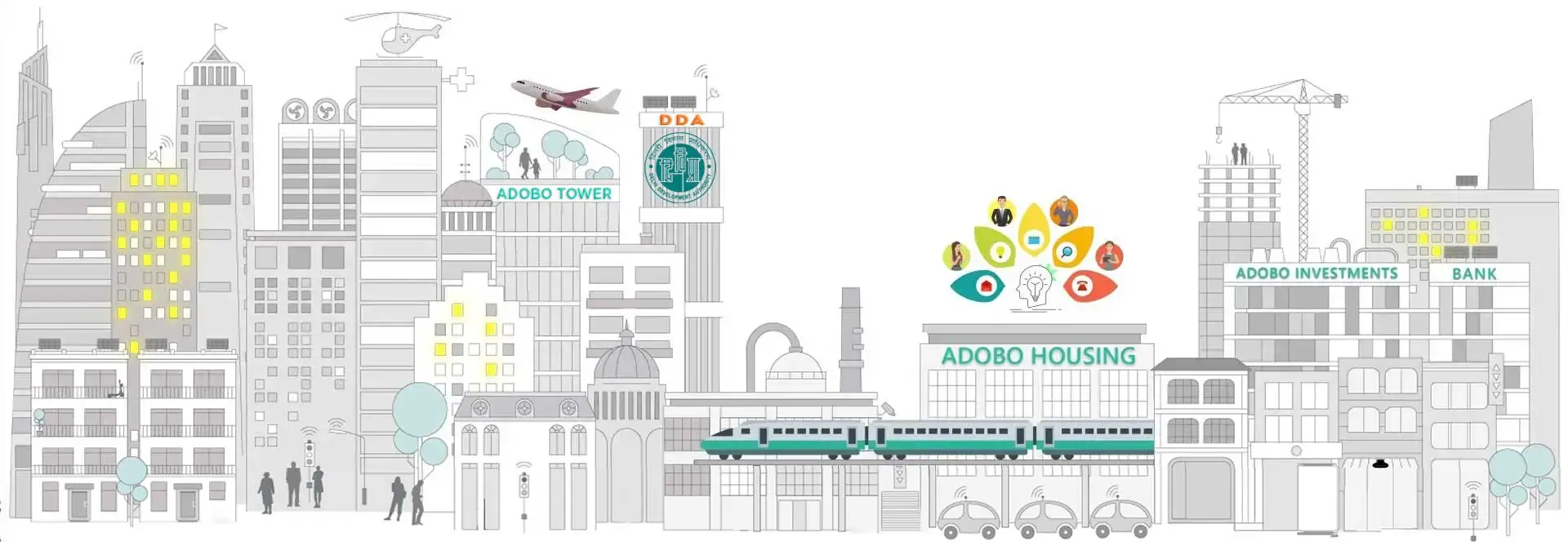



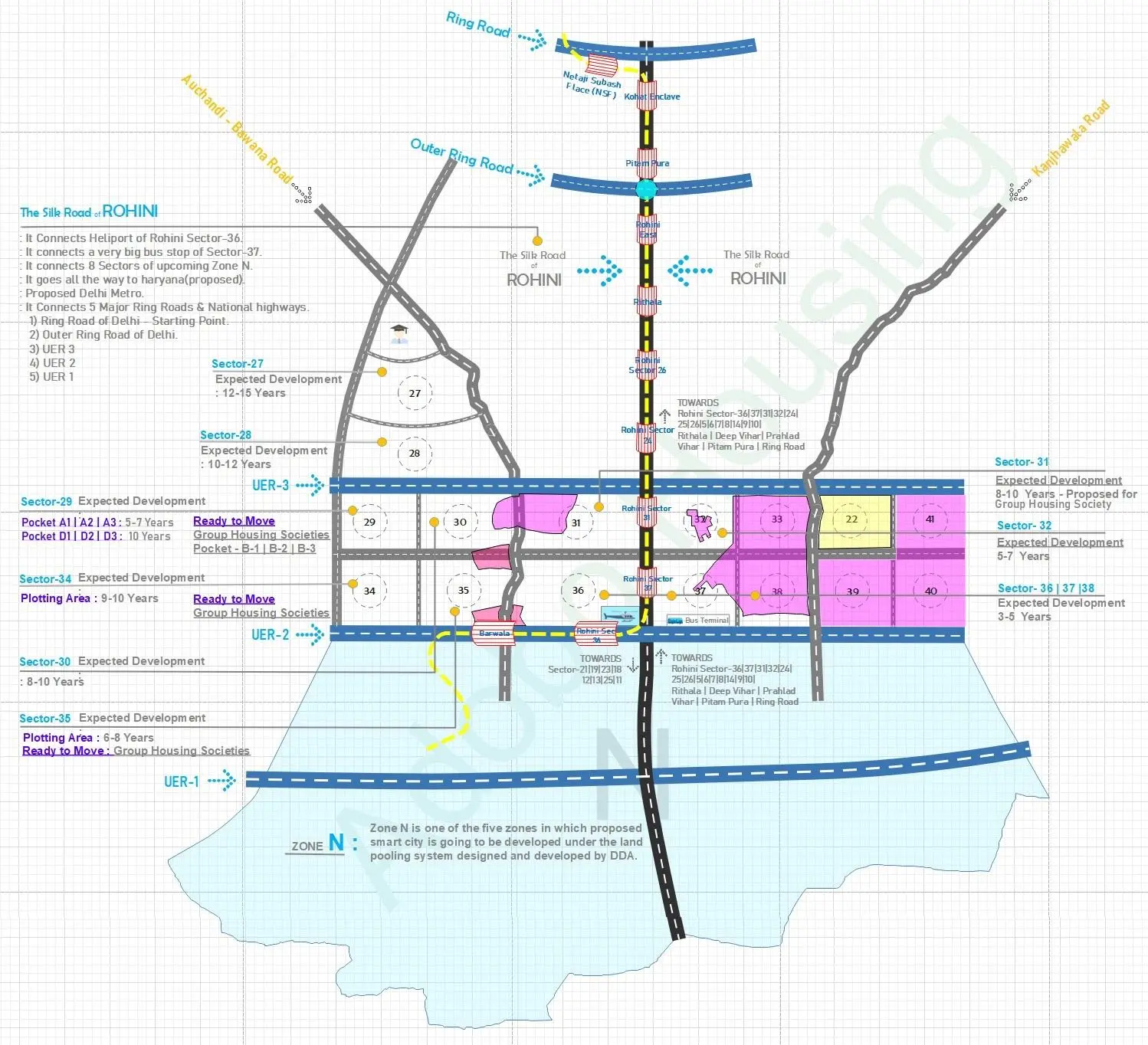



-1-2-3-Layout-Map.jpg)


